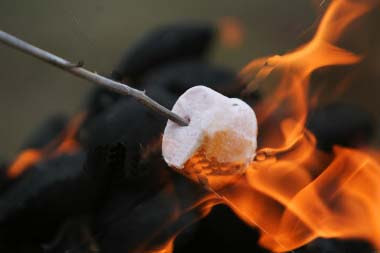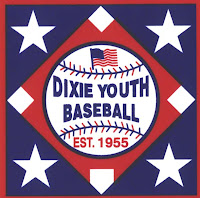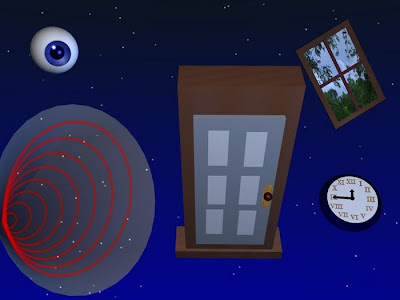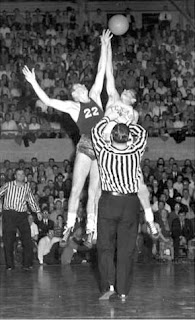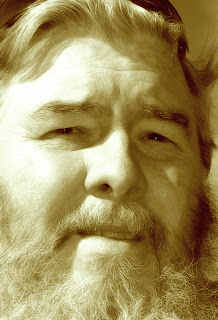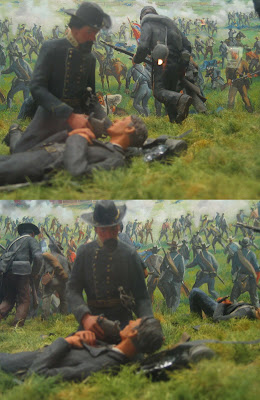Eine kleine Nachtmusik
Henry moves downstage center. He’s a big man of about 85, wearing a coat and an outlandish tie. His voice is high-pitched, particularly when he launches into an enthusiastic rendition of “Ain’t she sweet.”
Henryk – that’s Henry’s real first name – speaks and sings with a strong German accent. He’s Polish, by birth, but grew up speaking both languages.
Despite his size and age and his ability to sing on pitch, he’s nervous. His big hands roll, then fold and unfold the script, fingers trembling.
The performance is the fifth in a series of annual productions at a North Carolina retirement complex, but it’s Henry’s first. Until he signed up for the show, the recent newcomer felt like an outsider; now, he’s part of a group and feels good about making a contribution.
The script was written by one of the actors’ daughters, who also directs the show, she also plays piano and is chief prompter for those who forget their lines.
The performers portray a room full of “eighty-somethings” celebrating their 65th year high school class reunion.
The songs and stories obviously bring back sweet memories for many cast and audience members. Common experiences abound among Americans regardless of which part of the country they hail from or whether they graduated in 1942 or a decade earlier or later.
But Henryk’s history is very different. He never attended high school and while fellow cast members were finding sweethearts and preparing for service in the United States military, he was an unwilling participant in Adolph Hitler’s war effort. Henryk was on the other side: he was part of the Nazi war machine that menaced the world.
Two years before the German Blitzkrieg struck, Henryk’s family was a thriving part of the Polish middle class. His father owned a tavern and was a well-respected member of the community before he died suddenly, leaving a wife and four children to fend for themselves.
The invading Germans commandeered the tavern and exiled the family to eastern Poland where, one after the other, each of three sons was inducted into the German army. Henryk was forced to spend three years in the infamous Hitler Youth before being drafted.
The oldest son died in Leningrad and the winds of war separated the rest; Henryk didn’t see his mother for decades – long after he had resettled first in England and then in the U.S.
Though he never really participated in combat, Henryk was a member of a Polish unit assigned to help resist the American advance through Italy. In photographs from that time, he looks like any other member of the German army, posing with fellow uniformed soldiers.
At the end of the musical production, cast members sing anthems from each of the branches of the U.S. military. Henryk is seated in the back row, lending his high, clear voice to the choir.
One has to wonder what’s going through his mind when, in turn, other cast members rise with pride as each U.S. service song is presented. Does he recall songs from his youth – battle songs of the “other side?”
Looking back over the years that comprise a lifetime, each of us finds plenty of cause for celebration and for regret. We have acted for a variety of motives and have been influenced by a range of factors.Raised during the aftermath of World War II, I grew up hating young men dressed in the uniform Henryk wears in those fifty-plus-year-old photos. I learned to feel suspicious of those who speak with an accent like his. And I despised all of those young people who joined the Hitler Youth.
But spending a few hours with Henry made me realize that the tides and winds and currents of major human events can overwhelm people caught up in their power and fury. It’s becoming more difficult to sort out victims and victimizers – one can’t always tell just by looking at the uniforms.
Should auld acquaintance be forgot,
and never brought to mind ?
Should auld acquaintance be forgot,
and auld lang syne ?
CHORUS:
For auld lang syne, my dear,
for auld lang syne,
we’ll take a cup o’ kindness yet,
for auld lang syne.
And surely ye’ll be your pint-stoup !
And surely I’ll be mine !
And we’ll take a cup o’ kindness yet,
for auld lang syne.
CHORUS
We twa hae run about the braes,
and pou’d the gowans fine;
But we’ve wander’d mony a weary fit,
sin’ auld lang syne.
CHORUS
We twa hae paidl’d in the burn,
frae morning sun till dine;
But seas between us braid hae roar’d
sin’ auld lang syne.
CHORUS
And there’s a hand, my trusty fiere!
And gies a hand o’ thine !
And we’ll tak a right gude-willie-waught,
for auld lang syne.
CHORUS
-- Robert Burns (1759-96)
